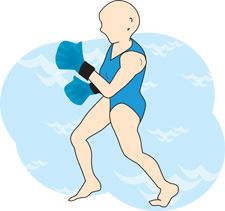Menopause, which commonly happens in a woman’s 40s or 50s, causes a variety of changes in the body that are triggered by the natural decline of reproductive hormones. When the body produces less of the female hormone estrogen, it puts a woman at increased risk for heart disease and loss of bone mass – a condition known as osteoporosis. Metabolism also slows down, which can lead to weight gain.
Regular exercise and a healthy diet play a key role in maintaining a healthy weight, protecting heart health, building muscle, and keeping bones strong after menopause. Recent studies have found promising evidence on the benefits of water exercise for postmenopausal women.
Movement in water has the potential to provide a protective effect for women as they age. Swimming and other forms of water exercise allow individuals the ability to perform strength and cardiovascular activities without putting strain on joints.
Until recently, it was largely thought that only land-based, high-impact exercise could help combat age-related bone loss. Research published this year in the Open Access Journal of Sports Medicine reviewed 11 studies with postmenopausal women, comparing land- and water-based exercise. The results found evidence that water-based exercise does have some benefits for maintaining or improving bone health, making it a viable alternative for those not able to perform land-based exercise.
Another study compared muscle metabolism in postmenopausal women engaging in water- and land-based exercises. Researchers found that, despite reports from participants saying they felt a similar level of exertion on land and water, the evidence suggested that water exercise caused higher muscle oxygen consumption. This could mean that water exercise burns more calories with the same perceived level of exertion.
Maintaining good heart health is also a concern after menopause, since female hormones help to protect a woman from heart disease earlier in life. A new study, published this month, examined the effects of dance-based aquatic exercise in obese postmenopausal women with knee arthritis. The results showed significant improvements in cardio-respiratory capacity and a lower post-exercise heart rate with less fatigue. This adds to a growing body of research demonstrating the positive effects water exercise has on the respiratory and cardiovascular systems.
Each study concluded that water fitness does play a role in maintaining good health for women after menopause.
Special thanks to the National Swimming Pool Foundation.
Studies Referenced:
Casilda-López, J., Valenza, M. C., Cabrera-Martos, I., Díaz-Pelegrina, A., Moreno-Ramírez, M. P., & Valenza-Demet, G. (2017). Effects of a dance-based aquatic exercise program in obese postmenopausal women with knee osteoarthritis: a randomized controlled trial, 24,(7), 768-773. Retrieved from http://journals.lww.com/menopausejournal/Abstract/2017/07000/Effects_of_a_dance_based_aquatic_exercise_program.9.aspx
Eastell, R., O’Neill, T., Hofbauer, L. C., Langdahl, B., Reid, I. R., Gold, D. T., & Cummings, S. R. (2016). Postmenopausal osteoporosis. Nature Reviews Disease Primers, 2. Retrieved from https://www.nature.com/articles/nrdp201669
Ma, G., Chen, W.-C., Tsai, S.-M., Kan, N.-W., Chiu, L.-L., & Chien, K.-Y. (2017). Ratings of Perceived Exertion and Physiological Parameters of Muscle Metabolism in Postmenopausal Women. Perceptual and Motor Skills, Epub ahead of print. http://doi.org/10.1177/0031512516689403
Mayo Clinic Staff. (2015, January 7). Menopause. Retrieved from http://www.mayoclinic.org/diseases-conditions/menopause/basics/definition/con-20019726
Simas, V., Hing, W., Pope, R., & Climstein, M. (2017). Effects of water-based exercise on bone health of middle-aged and older adults: a systematic review and meta-analysis. Open Access Journal of Sports Medicine, Volume 8, 39-60. Retrieved from https://www.ncbi.nlm.nih.gov/pmc/articles/PMC5376183/.



